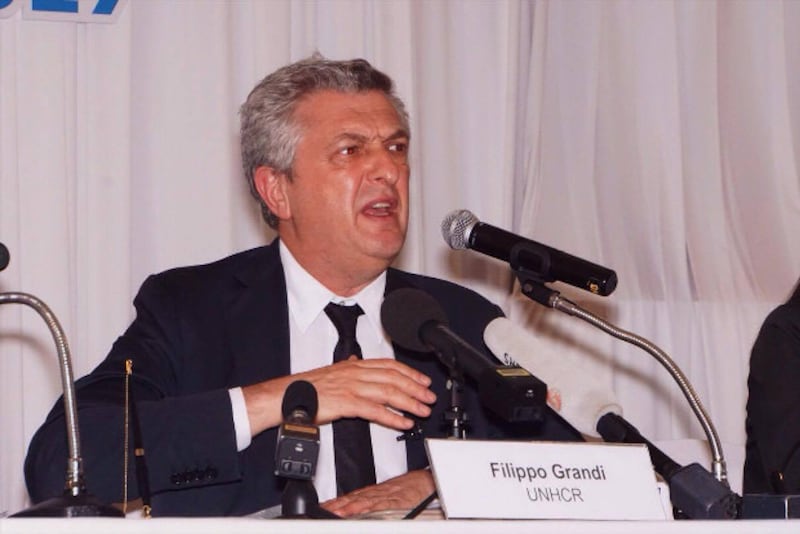The head of the U.N.’s refugee agency said he met with the Thai prime minister in Bangkok on Friday to discuss efforts to repatriate refugees from Myanmar voluntarily and improve conditions for tens of thousands of foreigners sheltering in Thailand.
Filippo Grandi, the United Nations High Commissioner for Refugees, told a post-meeting news conference that Prime Minister Prayuth Chan-o-cha said that his government would be willing to aid Myanmar refugees return home on their volition. The PM also agreed to develop a procedure to better evaluate claims for refugee status and protection put in by people who seek refuge in Thailand, Grandi said.
During a stop in Myanmar earlier this week, Grandi had met with Aung San Suu Kyi, Myanmar’s state counselor, who said her government would welcome back people who had fled the country.
“The Thai prime minister agreed to pursue the continued return of Myanmar refugees to Myanmar … it was very clear that he agreed with the message he heard from Myanmar’s government, that return must be voluntary, sustainable and gradual,” Grandi, who was making his first visit to Thailand as chief of the U.N. refugee agency (UNHCR), told reporters.
In October 2016, a group of refugees returned home to Myanmar, according to Grandi who said both countries were preparing for the return of another 200.
During the press conference, Grandi said Prayuth had reiterated Thailand’s commitment to create a mechanism for evaluating refugee status for people sheltering inside the country. He said UNHCR was working with the government to train officials to ensure that this happens.
On top of that, the Thai government is taking steps to allow refugees to have access to education while reducing risks for refugees and asylum seekers who are detained, Grandi said.
He praised the government for its efforts to grant Thai nationality status to stateless persons, pointing out there were more than 500,000 such people in the country.

Incidents of forced repatriation
Thailand is home to about 102,000 refugees, a majority of whom are from neighboring Myanmar and live in temporary shelters along the border, according to statement issued Friday by Human Rights Watch (HRW) and a dozen other rights organizations and NGOs. According to them, in Thailand there are 8,000 “urban refugees” from countries including Pakistan, Vietnam, Somalia, Iraq, Palestine, Syria and China who live in the Bangkok region.
The joint statement issued ahead of the meeting between Grandi and Prayuth, called on the Thai government to demonstrate a “commitment to protecting refugees by ending abusive practices as well as instituting and implementing laws that guarantee rights of refugees.”
Despite pledges by Thailand’s military-run government to protect refugees and improve conditions for them, the junta has failed in these efforts and put some of them at risk by forcing them to return to their home countries, the NGOs said jointly.
“In recent years, Thai authorities have forcibly returned refugees, asylum seekers and others based on the requests of foreign governments, despite the credible risk of torture or other grave human rights abuses,” the 13 NGOs said.
The groups cited a May 26 case where the Thai government returned Turkish national Furkan Sökmen to the custody of authorities in Turkey, despite warnings by U.N. agencies that he would face human rights violations.
In 2015, Thailand returned about 100 Muslim minority Uyghurs to China, where they faced prosecution, the rights groups alleged. In other instances, Thai authorities have intercepted boats carrying refugees and have towed them out to sea, endangering the lives of those on board, the NGOs said.
The groups also expressed concern about Thailand’s protracted detention of some refugees in immigrant detention centers. Some refugees have spent years in the centers that are designed for stays of up to 15 days.
They called on the government to work with UNHCR, civil groups and refugees to develop an effective and fair procedure to evaluate claims of refugee status and protection, pointing out that Thailand lacks a legal framework to assess asylum claims.
Their five-page statement ended with a series of requests for the Thai government, including asking Prayuth to instruct relevant ministries and state security forces to discontinue a policy of forcing boats back to sea and the practice of unofficial deportations.
In addition, the NGOs asked the government to end arbitrary and indefinite detention and assure that all refugees were provided access to legal documentation, health care, work permits, educational opportunities and other forms of assistance.
Maj. Gen. Weerachon Sukhonthapatipak, a spokesman for the Thai government, told reporters that it would focus on education, public health and basic needs, including providing temporary shelter for refugees. He also thanked UNHCR for its assistance.
